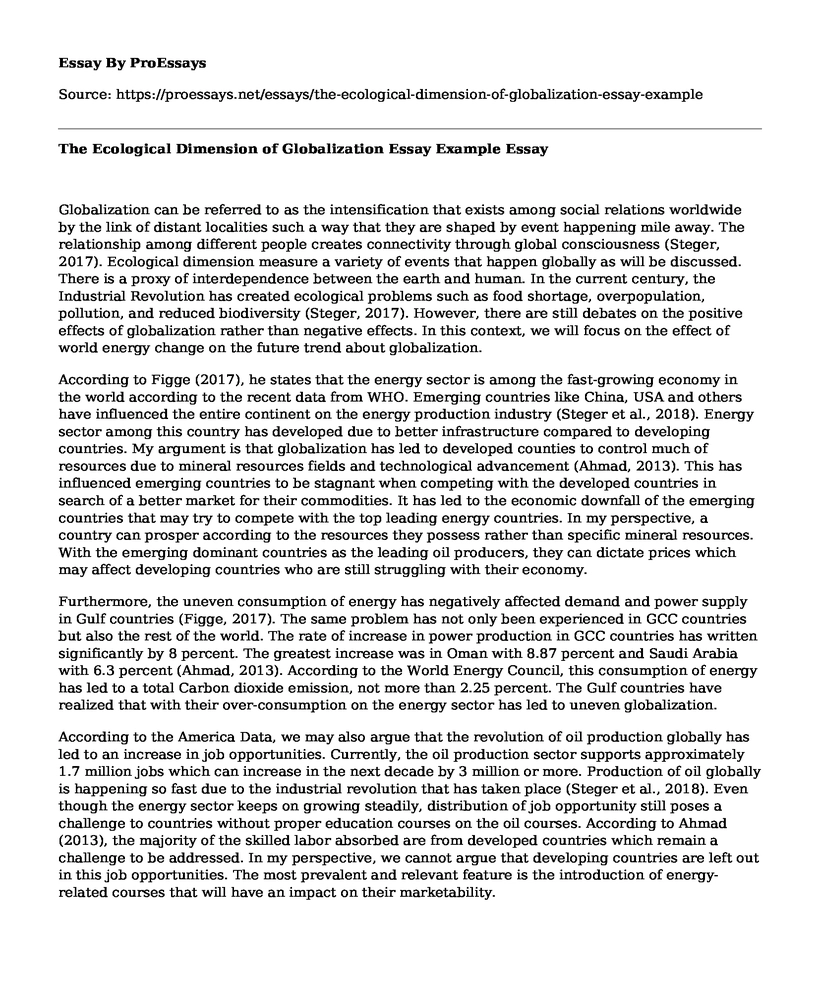Globalization can be referred to as the intensification that exists among social relations worldwide by the link of distant localities such a way that they are shaped by event happening mile away. The relationship among different people creates connectivity through global consciousness (Steger, 2017). Ecological dimension measure a variety of events that happen globally as will be discussed. There is a proxy of interdependence between the earth and human. In the current century, the Industrial Revolution has created ecological problems such as food shortage, overpopulation, pollution, and reduced biodiversity (Steger, 2017). However, there are still debates on the positive effects of globalization rather than negative effects. In this context, we will focus on the effect of world energy change on the future trend about globalization.
According to Figge (2017), he states that the energy sector is among the fast-growing economy in the world according to the recent data from WHO. Emerging countries like China, USA and others have influenced the entire continent on the energy production industry (Steger et al., 2018). Energy sector among this country has developed due to better infrastructure compared to developing countries. My argument is that globalization has led to developed counties to control much of resources due to mineral resources fields and technological advancement (Ahmad, 2013). This has influenced emerging countries to be stagnant when competing with the developed countries in search of a better market for their commodities. It has led to the economic downfall of the emerging countries that may try to compete with the top leading energy countries. In my perspective, a country can prosper according to the resources they possess rather than specific mineral resources. With the emerging dominant countries as the leading oil producers, they can dictate prices which may affect developing countries who are still struggling with their economy.
Furthermore, the uneven consumption of energy has negatively affected demand and power supply in Gulf countries (Figge, 2017). The same problem has not only been experienced in GCC countries but also the rest of the world. The rate of increase in power production in GCC countries has written significantly by 8 percent. The greatest increase was in Oman with 8.87 percent and Saudi Arabia with 6.3 percent (Ahmad, 2013). According to the World Energy Council, this consumption of energy has led to a total Carbon dioxide emission, not more than 2.25 percent. The Gulf countries have realized that with their over-consumption on the energy sector has led to uneven globalization.
According to the America Data, we may also argue that the revolution of oil production globally has led to an increase in job opportunities. Currently, the oil production sector supports approximately 1.7 million jobs which can increase in the next decade by 3 million or more. Production of oil globally is happening so fast due to the industrial revolution that has taken place (Steger et al., 2018). Even though the energy sector keeps on growing steadily, distribution of job opportunity still poses a challenge to countries without proper education courses on the oil courses. According to Ahmad (2013), the majority of the skilled labor absorbed are from developed countries which remain a challenge to be addressed. In my perspective, we cannot argue that developing countries are left out in this job opportunities. The most prevalent and relevant feature is the introduction of energy-related courses that will have an impact on their marketability.
Conclusion
In conclusion, globalization has created a positive and negative impact globally. Therefore, proper policies should be in place to control emerging sectors of oil production to harness accountability. To sum up, globalization in the energy sector has to be guided by proper design and avoid environmental degradation.
References
Ahmad, A., & Babar, M. (2013). Effect of energy market globalization over the power sector of GCC region: a short review. Smart Grid and Renewable Energy, 4(03), 265. http://dx.doi.org/10.4236/sgre.2013.43032
Figge, L. S. (2017). Connectedness in times of ecological overshoot: a quantitative analysis of the sustainability of globalization (Doctoral dissertation, Maastricht University). https://cris.maastrichtuniversity.nl/ws/files/15739394/c5774.pdf
Steger, M. B. (2017). Globalization: A very short introduction (Vol. 86). Oxford University Press.
Cite this page
The Ecological Dimension of Globalization Essay Example. (2022, Nov 20). Retrieved from https://proessays.net/essays/the-ecological-dimension-of-globalization-essay-example
If you are the original author of this essay and no longer wish to have it published on the ProEssays website, please click below to request its removal:
- Microeconomic Analysis Paper for Apple Inc
- Essay Sample on Environmental Pollution: The Growing Crisis and Its Effects
- Employee Training & Development: Essential for Improving Organizational Performance - Essay Sample
- Volkswagen: Unethical Practice of Software Engineering Exposed - Essay Sample
- Caucus: A Separate & Private Meeting to Resolve Disputes - Essay Sample
- Essay Example on Gold: Precious Metal Riding High in Global Market Despite Recession
- Employee Turnover: Causes, Challenges & Solutions - Essay Sample







